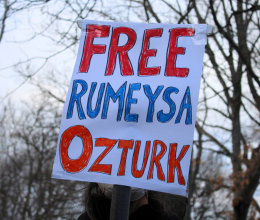
A federal court has approved the voluntary dismissal of an ACLU lawsuit seeking the release of immigrants detained in a unit at the Plymouth County Correctional Facility (PCCF). The dismissal follows nearly a year of litigation to protect vulnerable people from COVID-19, during which the unit population was reduced by over 90 percent, all remaining class members were offered vaccination against COVID-19 infection, and the facility conducted several rounds of universal testing.
Carol Rose, executive director of the ACLU of Massachusetts, today released the following statement in response:
“Detention should not be a death sentence. We are grateful that over 40 class members have been able to return home where they can protect their health. At the same time, we continue to press for others to get that same relief. As COVID-19 cases again begin to rise in Massachusetts, more action is required to protect the health of incarcerated people, correctional staff, and community members. Massachusetts jails and prisons must act now to reduce incarceration levels and increase testing. Public health experts have been clear: This country won’t be able to get the pandemic under control unless we’re able to get it under control in jails and prisons.”
Background:
In June 2020, the ACLU of Massachusetts and its co-counsel—law firm K&L Gates LLP and several Boston-based immigration attorneys—were appointed to represent a class of immigrants detained in Unit C-3 of the PCCF. The class members were seeking release due to the risk of contracting COVID-19 in the facility. The court yesterday granted the parties’ joint motion to dismiss the lawsuit, Augusto v. Moniz. Since the lawsuit was filed, the population of the unit was reduced by over 90 percent. During several recent rounds of universal testing, no class members tested positive for COVID-19. PCCF has now offered the COVID-19 vaccine to all staff members and people in its custody, including the remaining detained class members.
Since the pandemic’s start, the ACLU of Massachusetts has filed several legal actions related to detention centers, prisons, and jails, and has urged government officials to ensure a response plan that protects the health, safety, and civil liberties of all incarcerated people.
In addition to Augusto v. Moniz, the ACLU, the Massachusetts Association of Criminal Defense Lawyers (MACDL) and the Committee for Public Counsel Services (CPCS) filed a lawsuit in March 2020 to protect communities from COVID-19 outbreaks by reducing the numbers of people who are incarcerated in Massachusetts jails and prisons. On April 3, the Supreme Judicial Court issued an order to help some pretrial detainees seeking release due to the pandemic. The Court also ordered the jails and prisons to regularly provide data regarding their population, releases pursuant to the court decision, COVID-19 tests, and test results, and COVID-related deaths, which continues to be reported on a weekly basis.
In December, the organizations once again filed a related complaint on behalf of CPCS and MACDL arguing that the court-ordered data demonstrated that more relief was now constitutionally required in Massachusetts Houses of Correction (HOCs). Specifically, the lawsuit asks the Court to order the HOCs to increase routine testing of non-symptomatic incarcerated people and staff, and to use their statutory authorities to decrease the incarcerated population.
As of March 30, 2021, most HOCs had a higher population than they had on July 1, 2020 and the number of reported COVID-19 cases among incarcerated people and staff was over 7,000. Because the HOCs’ testing rates are so low, these reported cases likely underestimate the true number of infections; indeed, as of March 30, 2021, the cumulative number of COVID-19 tests at four facilities was less than the total population at each facility as of that date, suggesting that they had not even tested their entire population just one time over the course of more than a year.
While the state is now offering the vaccine to incarcerated people and staff, public health experts explain that the vast majority of people working and incarcerated in jails will have to be vaccinated in order to achieve community immunity. Contrary to a court order, four of the HOCs are not reporting staff vaccine refusals; the nine which are report at least 1,600 staff have declined to receive a vaccine from the HOCs.




